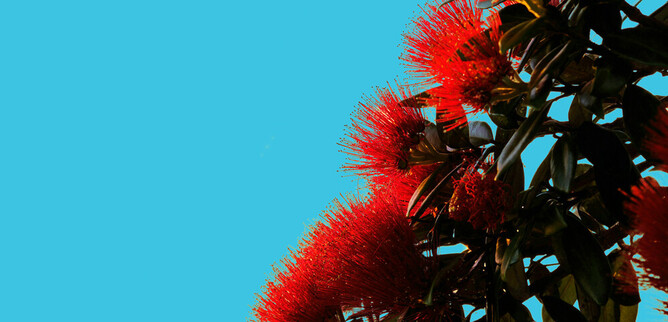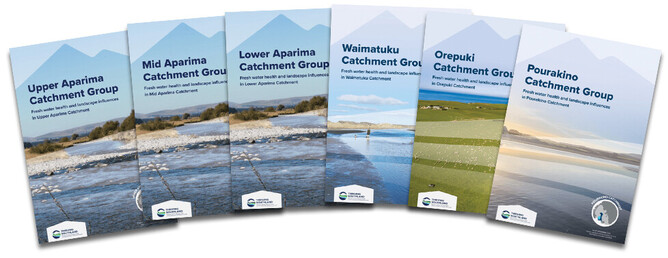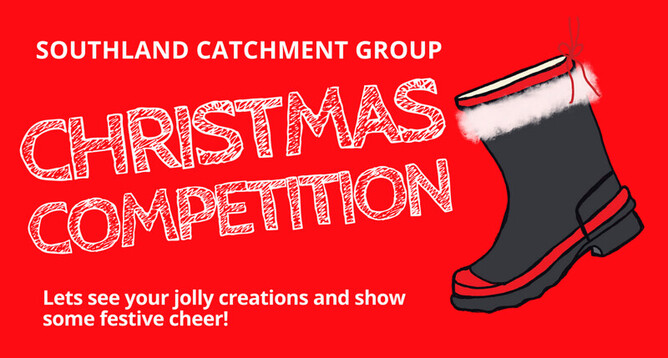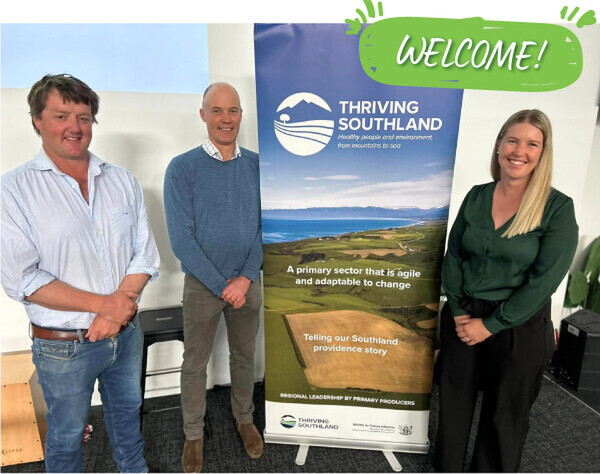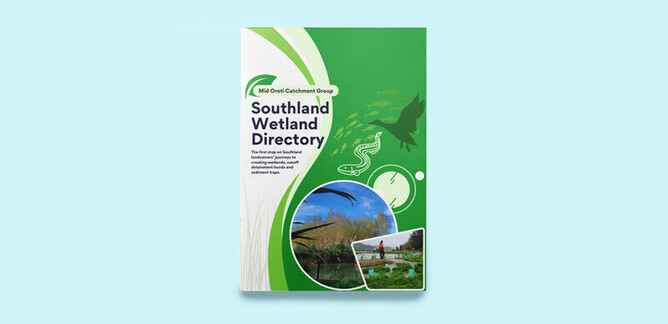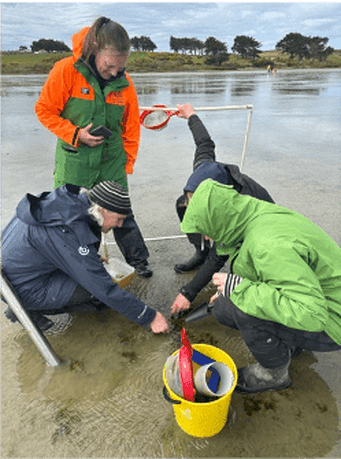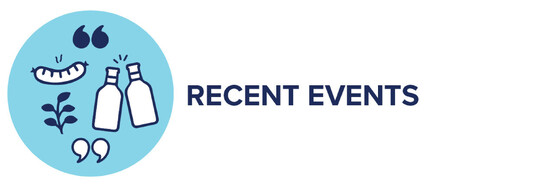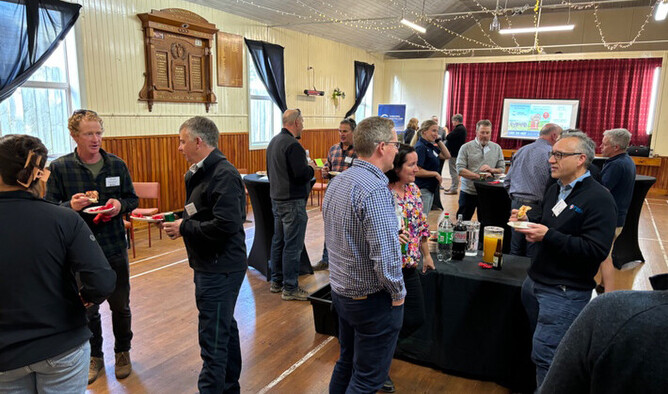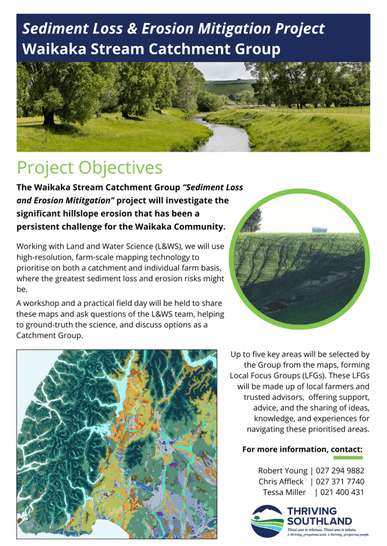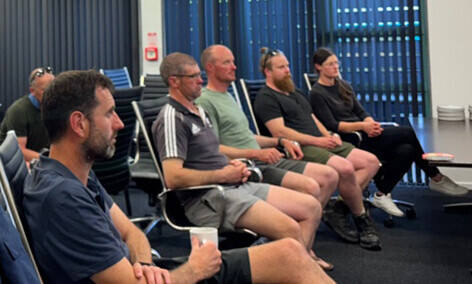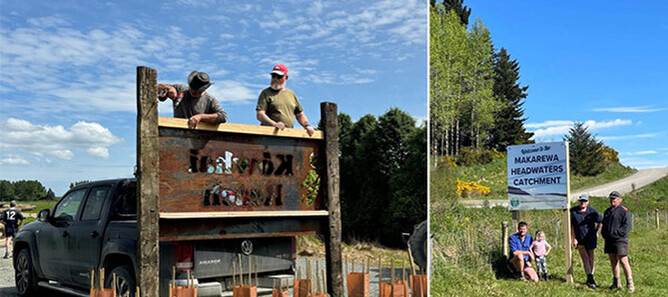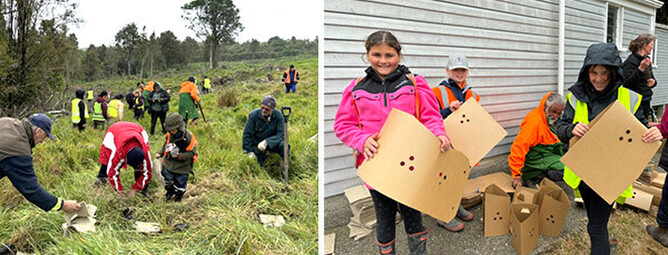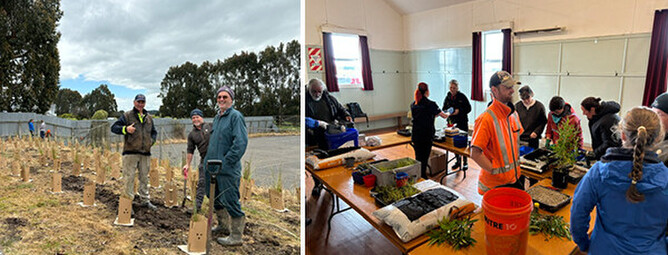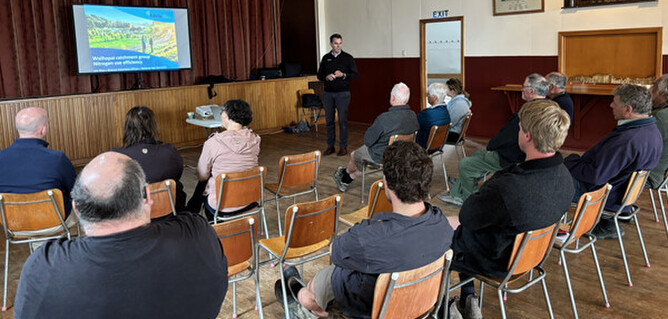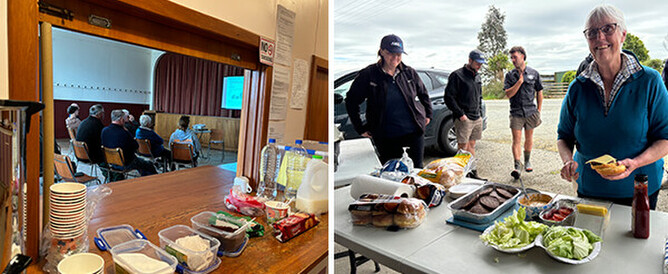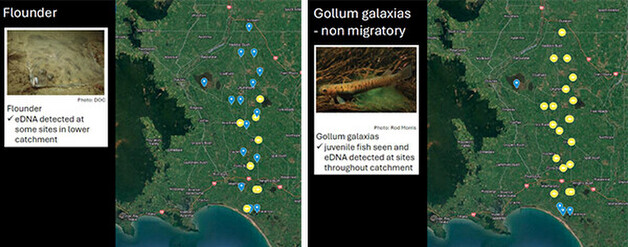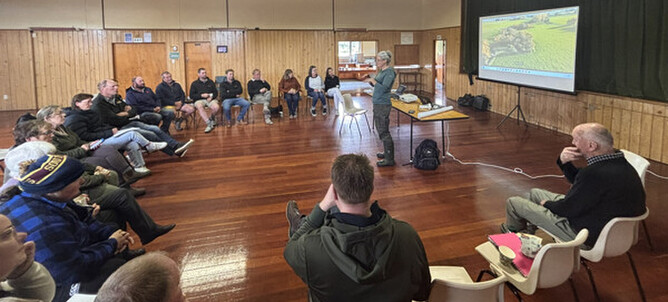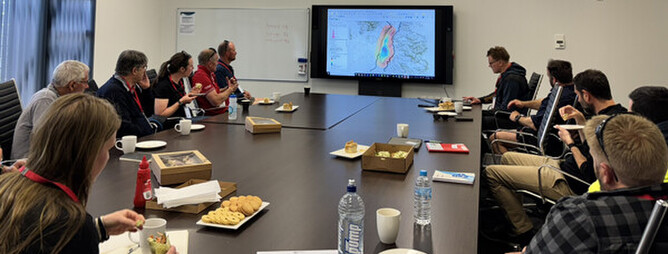Welcome to the Thriving Southland Newsletter
As the year draws to a close, it’s timely to reflect on the amazing Catchment Group work that is making a real difference in Southland.
We held our AGM in Otautau mid-November and were delighted to have more than 50 people come along. We heard some fascinating insights from Neal Wallace’s recent overseas trip and focused the great year that’s been.
Thriving Southland is celebrating five years this year and there’s a lot to smile about in the Catchment Group space:
Southland now has 37 Catchment Groups (started with 18)
Groups cover more than 90% of the region
About 1500 farmers involved in their local Catchment Groups
147 Catchment Group projects to date
Some highlights of the past year have included the Balfour Catchment Group, who won the Environmental Action in Water Quality Award at the Environment Southland Community Awards.
It’s also satisfying to see Catchment Groups working together to tackle wider ranging challenges, such as the Edendale Aquifer Group’s Understanding our Water Quality Project.
There is plenty happening as 2024 winds down and we’re delighted to be holding our annual Christmas Competition again. More below
Our next newsletter will be in February, so we hope you have a relaxing, enjoyable and safe Christmas and New Year season - and all the best for 2025!
Resource of the Month
Catchment Factsheets
We’ve pulled a whole range of information together into brochures; providing insights based on available information, bringing together published science, research, data and information on the state of water, soil and land in catchments. Check them out here.
Christmas Displays Competition
Show us your best Christmas creations! Enter as a Catchment Group, business, individual, farm, or any way that suits you.
Whether you’re painting bales, lining up pallets, or getting creative with your Christmas display, we can’t wait to see it. There’s an awesome pool of prizes up for grabs this year - check out all the details here.
International interest in Southland’s Catchment Group model
Southland’s innovative Catchment Group model appears to be turning heads internationally.
At the Thriving Southland AGM, Chairman Jeff Grant acknowledged the challenges the “wettest spring in 43 years” had presented but praised farmers’ resilience and innovation in looking for continuous improvement.
Project lead Richard Kyte said things started to happen when information and science “pertaining to where they lived” was put in farmers’ hands.
“We’re seeing some major work being done that’s making a difference now,” he said.
The Catchment Group model is attracting international interest, although some European farming leaders could not believe Southland farmers were taking action voluntarily, Kyte said.
Guest speaker, well-known agriculture journalist Neal Wallace presented insights from his recent overseas trip:
New Zealand farmers had done the hard work, and our production systems were recognised as efficient, with a low carbon footprint.
Market access would be an ongoing challenge, and farmers needed to earn the right to supply premium clients, who had increasingly stringent sustainability requirements.
Transparency of farming practice was essential.
There were also new competitors to consider.
Lamb export markets were very challenging, and New Zealand producers were working hard to innovate with new products.
Dairy protein exports seemed to have a very secure future.
Dutch dairy farms presented interesting case studies.
Welcoming our new Board members
Edward, Simon and Alexis
We welcome Alexis Wadworth, Edward Pinckney and Simon Saunders onto the Thriving Southland board.
Alexis, in partnership with husband Nick, farms a 2000ha central Southland property, Bare Hill. Alexis has a background in rural banking and is currently Chair of the Makarewa Headwaters Catchment Group. She has previously held numerous governance roles, including Trustee Southern Dairy Development Trust (Southern Dairy Hub), Board member of Woman in Sport Murihiku and a member of her local RMPP Meat Production.
Edward, and his wife Harriet, farm Jericho Station, a 1500ha, 13,500 sheep, beef and dairy grazing property near Manapouri, and a 700 cow/250 ha property near Riverton, as well as diversifying into agritourism and bee/honey enterprises. Edward is currently Chair the Telford Education Advisory Board and has completed Rabo Bank Executive Development Program, Kelloggs Rural leadership, and the Nuffield Scholarship.
Simon, and his wife Annabel, farm Stag Valley, a 1400ha sheep, beef, dairy heifer grazing and forestry property just west of Lumsden in northern Southland. Simon spent 14 years heavily involved with NZ Farm Environment Trust and the BFEA awards. This included Southland Judging co-coordinator, nine years on the National Trust with four years as the Chair and also chairing the National judging panel for three years.
Want to learn more about Winton Streams Wonderful Wetland Tool?
You might have heard about Mid Oreti’s new wetland, bund and flow pathway tool for the Winton Stream’s catchment, aka Marshalling the Best Project. The tool and the Storymap that goes with it is on the Mid Oreti Catchment Group webpage.
Catch the Muster interview here. There’s also a podcast episode coming up, a two-page project summary and drop-in sessions planned.Even better, the Group have just released their Wetland Directory on the Thriving Southland website, which is full of practical information.
Even better, the Group have just released their Wetland Directory on the Thriving Southland website, which is full of practical information.
Do you want to have some fun and find out how healthy your estuary is?
Thriving Southland have a fantastic (and fun!) kit that you can borrow for free and use down at your estuary. The Marine Metre Squared kit was created by the NZ Marine Studies Centre, University of Otago and has everything you need in it.
Let your Catchment Coordinator know if you are keen to book the kit. Have a look here for more information.
Upper Waiau Catchment Group considering starting up again
There’s interest in restarting the Upper Waiau Catchment Group from existing members and newcomers.
The Group is keen to focus on what they already know and available out there, to help to frame a discussion on direction and purpose. If you’re interested in being part of the Group, have a chat with Thriving Southland’s catchment co-ordinator, Ginny Kennedy, or join the current Group members at a coffee and scone shout at the Sprig and Thistle on 11 December, sponsored by Rabobank and the Rural Support Trust. Ginny Kennedy on 021914765 or ginny@thrivingsouthland.co.nz
Catchment Group Leaders Forum a ‘Human Library’ experience
Another great Southland Catchment Group Forum was held in early November. We tried something new and had a Human Library and is was fantastic!
Conversations and ideas flowed and lots of amazing chats and connections were made over yummy Road Kill Pizza. Many thanks to our incredible official “books” - Sandra Campbell, Craig Simpson, James Rea, Hoani Cooper and Miranda Hunter, and all the wonderful extra books that joined them and shared their expertise and experiences over the evening.
Thanks to everyone who came and helped make it a great evening. We hope you got lots of ideas for your Catchment Groups and got your questions answered.
Sediment Loss and Erosion Mitigation Project
The Waikaka Stream Catchment Group recently met online with Land and Water Science to kick off their Sediment Loss and Erosion Mitigation Project. Led by Dr Clint Rissmann, the session provided valuable insights into the mapping process and what the Group can expect to learn from it.
Clint highlighted how this innovative mapping approach could help identify priority areas for sediment mitigation, ensuring efforts are targeted to achieve the greatest environmental and economic benefits.
The discussion sparked enthusiasm, as the Group looks forward to using this data to guide practical, cost-effective actions on the ground 'Best bang for Buck'.
Stacked Mitigations - Edendale Farm and Catchment N-Loss Modelling
The Edendale Aquifer Group recently met with DairyNZ’s project team from the Plantain Potency and Practice Trials and Low-N Systems projects.
The discussion centred on how the four partner farms in the Edendale Catchment could be modelled using Overseer and Farmax to explore strategies for reducing nitrogen leaching while maintaining profitable farm systems.
The Group is investigating a range of options, including improving nutrient recycling and the efficient use of nitrogen inputs, such as increasing effluent application areas and adjusting the timing of nitrogen fertiliser applications through to reducing supplementary feed and nitrogen fertiliser inputs to achieve significant reductions in nitrogen losses.
Currently, the Edendale Aquifer Group is working closely with DairyNZ to ensure the proposed mitigations align with their goals. Updates on the modelling outcomes and recommendations will be shared in the new year.
Kowhai Reach Revamp and Upgrade
Makarewa Headwaters Catchment Group have been busy supporting the upgrade of Kowhai Reach to include a new picnic area and outdoor classroom. Tractors, loaders, post drivers, trucks have been pulled into action to sort out the carpark and fences and it looks amazing.
The group have also put up some of their new Catchment Group signs – many thanks Westpac Water Care Grant - and have set up the shade area at their new native plant nursery. What a busy time of year!
Seeds, potting mix and sausages!
If you have locals keen to learn how to grow and look after their own native plants you should run one of these events. It was so much fun.
We started with a really practical and hands on session with seeds, compost, newspapers, ice cream tubs and secateurs, and learnt how to sow out our seeds, take cuttings and pot up our plants. We heard top tips to keep things easy, inexpensive and successful, and we watched two very short videos on how to use drones to sow native seeds in your farm gullies, and how a tractor spray boom could be modified to help easily spray gullies.
Craig from The Grocers in Woodlands cooked us a very tasty BBQ lunch, and then after a sausage or two, we all joined the wonderful Hedgehope School to plant 200 native plants around Mabel Bush Hall, and another 300 on Nigel and Mandy Johnston’s farm. It was an AWESOME 3 hour effort, and we hope everyone feels super proud of what they achieved every time they drive past.
Many, many thanks to the wonderful Ainsley & Brad from Mid Oreti Catchment Group & AB Lime, and Sandra Campbell Farmer, Otago South River Care member and MPI on farm support, for sharing all their wonderful knowledge in the practical, hands on session. To Gabby for being an amazing gopher helping where ever she was needed, and to Craig for cooking us a yummy sausage bbq.
Last but not least, HUGE thank you to the wonderful Hedgehope School students, parents and teachers that enthusiastically planted up 500 native plants at Mabel Bush Hall and on a nearby farm. You guys rock!
The group purchased the plants and student help using our Environment Southland Community Award prize money from last year. The plants and the help are part of a Hedgehope School fundraiser - call the school if you are interested in knowing more.
Nitrogen – how to use it well
Waihopai rounded up their year with a lunchtime talk by Jim Risk from Ballance Agri-Nutrients on Nitrogen use and efficiency. The group had been keen to make this talk happen for a while, and it was worth the wait. Jim covered why Nitrogen is important, how to use it efficiently, different forms and products, cost efficiencies, good management practices and soil testing.
Amanda & Mike from ANZ gave us an update on interest rates and produce prices, and cooked us all a delicious bbq lunch.
The event was held at the wonderful Morton Mains Community Centre, and we would love to host more evets there.
Farming environmentally and profitably into the future is really important to the Waihopai crew, and these two topics were a perfect way to end the year.
Many thanks to Jim for a great talk and Mike & Amanda for their update and delicious BBQ – it was very much appreciated by all.
Waimatuku Catchment Ngā Awa: A First Look at DOC and Iwi Baseline Findings
We recently had a good turnout of local farmers who came together to hear the baseline report for the Waimatuku catchment for the first time. This report, developed by DOC and iwi as part of the Ngā Awa River Restoration Programme, highlights their work identifying priorities for restoring biodiversity and more.
As we dug into the findings, some fascinating discoveries stood out, such as discovering lamprey, tuna, and the elusive Gollum galaxias. These results sparked plenty of discussion about the current state of our waterways and the opportunities.
This programme presents an opportunity to combine local efforts with access to expertise and resources. The baseline report will guide restoration efforts as the project progresses.
For those in the catchment, it means the potential to work on practical projects like riparian planting, habitat improvements, and water quality management. If you’ve got thoughts or ideas about the next steps for the Waimatuku catchment or the Ngā Awa project, now’s the time to share them. Together, we can build on what’s been started.
Waikawa Catchment Group - exploring our region
Thanks to Access2Experts funding, the Waikawa Catchment Group recently hosted an event that provided valuable insights from a panel of experts.
Dr. Clint Rissman from Land and Water Science highlighted how landscapes influence erosion and sediment loss, and potential mitigation strategies. Jesse Bythell offered practical advice for successful native planting, sharing techniques to maximise plant survival and long-term benefits, as well as protect landscapes from erosion and sediment loss.
Local freshwater ecologist Kelsi Hayes gave some valuable input, and we are excited about the "toolbox of mitigations" that these experts have pulled together for us. This will be loaded onto the Thriving Southland website in early 2025. The day finished up with a hands-on session using the Resolution farming app (that was generously donated to the Group with a free subscription), so farmers could map areas on their properties for improvement, focusing on erosion-prone zones and strategies to slow water flow.
Edendale Aquifer Group - Understanding Nitrogen Foundation Project
Recently, the Group met with DairyNZ for a workshop on "stacking" mitigations to reduce nitrogen losses across the catchment. DairyNZ shared insights from their Plantain Potency Programme, and Low N systems research, discussing solutions to help farmers lower nitrogen leaching while maintaining profitability.
Dr. Clint Rissman has completed an in-depth GIS analysis of the Edendale Aquifer, combining a wide range of data—including water quality, flow patterns, bore records, soils, and climate—to help us build a picture of the challenges within our catchment. His findings, presented to the EAG committee, sparked valuable discussions about the implications and potential actions. The committee plans to come back together in December to determine the next steps.
The Nitrate Testing programme continues to gain momentum, with more members of the community joining our monthly sessions (held every third Friday). Our next meeting will be on 20 December, starting with a BBQ and beer at the Scout Den in Edendale, kindly sponsored by ASB. The day will also feature a practical session to deepen our understanding of nitrate management.
Drop-in Sessions – Winton Stream’s new wetland tool
Curious about the new FREE online tool to help improve water quality and boosting biodiversity in the Winton Stream Catchment? Join us at one of our sessions to see how it works.
The tool is designed to help Winton Stream landowners identify the best spots to put wetlands, bunds and sediment traps, offering great benefits for both land and water. Find out more about the tool here.
Drop-In Sessions
Tuesday 3 December, 4pm - 6pm – AB Lime Nursery, 10 Bend Road, Winton
Wednesday 18 December, 11am - 12pm – Baileys Café, 237 Great North Road, Winton
Wednesday 29 January, 11am - 12pm – Baileys Café, 237 Great North Road, Winton
Tuesday 4 February, 4pm - 6pm – AB Lime Nursery, 10 Bend Road, Winton
Mini Forest Movement Native Plant Nursery drop-in session (first Tuesday of every month)
Tuesday 3 November, from 4pm to 6pm
AB Lime Nursery, 10 Bend Road, Winton
All welcome to come to our monthly native plant growing working-bee evenings at the AB Lime Nursery. Your help will go toward growing plants for the Mid Oreti Mini Forest Movement Project, which provides native plants to the local community and landowners for their planting projects. Training is provided and all ages welcome! Stay for as little or as long as you like.
Christmas event: Hands on workshop with Fare Game
Brought to you by the Waikawa, South Coast and Titiroa Catchment Groups
Wednesday 11 December, from 5.30pm
Tokanui Hall
Deer are a major pest across our catchments, but in this workshop, you will learn how to turn these pests into a valuable resource. We’ll cover everything from breaking down a deer to special cuts, plus some “sharp” knife skills you’ll want to take home.
RSVPs are essential. Please RSVP to Tessa Miller, Catchment Coordinator on
021 400 431. Check out our website for details.
Save the date - Southland Agritech and Innovation Day
Thursday 1 May 2025
Southern Field Days Site, Waimumu
After a successful event in 2024, we are bringing back Southland Agritech and Innovation Day in 2025. More details to come but pop the date – Thursday 1 May - in your calendar now. Read all about the 2024 event here - https://www.thrivingsouthland.co.nz/agritech2024/
There are likely to be more events in the pipeline so make sure you check out the events section on the Thriving Southland website and the Facebook page for details.
Have a great December,
Ngā mihi
Richard Kyte (Thriving Southland Project Lead) and the Thriving Southland Team
